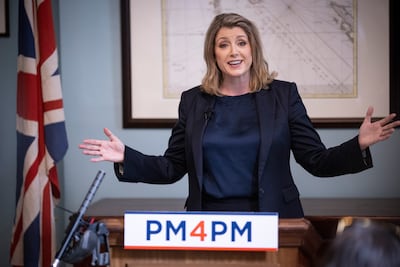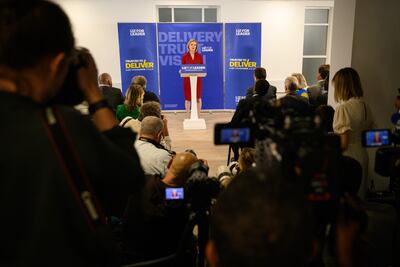Liz Truss began her fightback in the Tory leadership contest on Thursday by saying she was ready to “hit the ground running” as Britain’s next prime minister, as the rise of her less seasoned rival Penny Mordaunt threatened to knock her campaign off course.
Allowing herself only the slightest chuckle when asked melodramatically about the “March of Mordaunt”, the foreign secretary told journalists at her first major campaign speech that she would not be drawn into a public slanging match with the candidate who knocked her into third place in the first round of balloting.
But there was little doubt whose CV she was comparing hers with when she said: “I am the person in this race with the record of delivery … my experience, my record of delivery is needed to get the job done.”
Having waited until after round one to throw herself into the campaign, Ms Truss was keen to remind her audience that she had the responsibilities of a foreign secretary during the war in Ukraine.
Ms Mordaunt, a junior minister who was very briefly defence secretary in 2019, has been described as a potential compromise candidate after serving quietly under Boris Johnson without making enemies on the Tory benches.
Ms Truss, meanwhile, has been in cabinet since 2014 and is seen as the main flag-bearer of the right of the party, but only came third behind Ms Mordaunt and former chancellor Rishi Sunak in Tuesday’s first round of voting by Tory MPs.
In her launch speech she was keen to talk about her younger days as well as her cabinet experience, saying her background as a comprehensive school pupil in Leeds set her apart from upper-crust Tories and gave her a desire to create an “aspiration nation” if she wins the race.

She spoke of continuing the “levelling up” agenda of Mr Johnson, whose election victory in 2019 saw sweeping Tory gains in the poorer north of England, although she said this would happen “in a Conservative way”.
Her specific promises included an offer of tax cuts to match those being promised by almost all of the six candidates, and economic reforms to make Britain a “high-growth economy” in the next 10 years.
Money would be raised by trimming the public sector and delaying payments on coronavirus-related debt, Ms Truss said, freeing up cash that could see defence spending rise to 3 per cent of gross domestic product by 2030.
Her economic ideas would include new “low-tax, low-regulation zones” to attract investors, regenerating deprived areas in a manner modelled on the London Docklands, and cutting regulations for farmers, she said.
“We need to be honest with the public. This will be tough. It will take time. But I am determined to deliver,” she said to applause from supportive MPs, who included cabinet ministers Nadine Dorries and Kwasi Kwarteng.
Did the backing of Johnson loyalists constitute a “kiss of death” from the unpopular prime minister, she was asked? Like Mr Sunak before her, Ms Truss sought to create some distance without openly attacking Mr Johnson.
She said she had criticised a rise in National Insurance behind closed doors, although she publicly supported it at the time, and would reverse it if elected prime minister.

If all goes to plan the economy could be on an “upward trajectory” by 2024, she said, without needing to remind the MPs in front of her that the next general election is expected that year.
“The next election will be about the economy, and Liz is ready to deliver radical change from day one,” said Mr Kwarteng, warming up the audience while Ms Truss huddled with aides before her speech.
Not all of her team appeared to have got the message of civility, with Simon Clarke, one of her supporters in the cabinet, endorsing an astonishing attack on Ms Mordaunt by former Brexit negotiator Lord Frost.
“I’m quite surprised that she is where she is in this leadership race,” Lord Frost told Talk TV, before revealing he had asked outgoing Prime Minister Boris Johnson to drop Ms Mordaunt from his negotiating team last year.
“I felt she did not master the detail that was necessary in the negotiations. She wouldn’t always deliver tough messages to the European Union when that was necessary.
“And I’m afraid she wasn’t fully accountable, she wasn’t always visible, sometimes I didn’t even know where she was. I’m afraid this became such a problem that after six months I had to ask the prime minister to move her on.”
Mr Clarke said Lord Frost’s warning was “a really serious one … [we] need a leader who is tested and ready.”
Ms Truss meanwhile now bills herself as an enthusiast for Brexit, and a hardliner in talks with the EU, despite having opposed Britain’s departure from the bloc in the 2016 referendum campaign.
In foreign policy, she would continue Mr Johnson’s efforts to rally world leaders against Russia and “make sure that Ukraine prevails”, she said.
“I don’t give in to Whitehall. I don’t give in to vested interests. And I don’t give in to the naysayers,” she said, hours before MPs vote for a second time. “I’ve proved time and time again that I can deliver even when it’s difficult.”


























